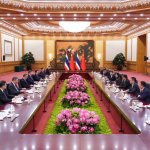
Thailand’s Parliament recently selected its next Prime Minister, but there was never any real doubt about who would emerge the winner: 2014 coup leader and current Prime Minister Prayut Chan-o-cha. While the vote ends Thailand’s protracted election season, the 2019 election leaves much to be desired in terms of adherence to democratic norms.
Thailand’s royalist conservative Democrat Party announced plans to join the pro-junta coalition, led by the pro-government Palang Pracharath Party. The Democrat Party won concessions in backing Prayut, including some of its economic policies being a part of the government’s anti-poverty policy, as well as some anti-corruption and transparency measures. All but assured of victory, Prayut defeated his challenger, the charismatic auto parts billionaire Thanathorn Juangroongruangkit by more than 200 votes, mustering 500 to Thanathorn’s meager 244. Prayut’s victory was all but guaranteed after the support of 250 hand-picked Senators and a coalition of smaller parties after some behind-the-scenes talks.
The process was foggy and corrupt. One day before the vote in Parliament, the Future Forward Party one of the opposition parties claimed that the procedure was rife with corruption and vote buying, with some MPs being reportedly offered more than 100 million baht for each vote cast for Prayut. One MP, Anawil Rattanasathaporn from Pathum Thani province, said that he was twice approached by individuals who offered him up to 60 million baht. Sadly, Wednesday’s vote for Prime Minister revealed something not so new about the morality of Thai politicians, who reversed campaign promises and abandoned their principles in exchange for the prospect of Cabinet positions. It was not only the Democrat Party who switched positions after harshly criticising the junta before the March 24 election. Smaller, weaker parties compromised their own positions to take a seat at the junta’s cash-filled table.

A more important outcome from the March 24 election is that the military government, who took power in May 2014 and consolidated that power on Wednesday have managed to re-write Thailand’s election rules. First, it was written explicitly under the direct supervision of the junta and signed into law in 2017. It allowed, as transpired, the loser of the election to lead the government. Second, the Prime Minister was chosen by a joint session of the Senate, whose 250 members were nominated directly by the military. The reminder was the culmination of efforts to establish a pro-junta party, comprised of technocrats and individuals from other parties who found favor by jointing the pro-junta coalition.
Turning back to the election itself, it was a complete charade. The junta only permitted campaigning three months prior to the elections. However, completely free and fair elections require that political parties have the widest possible opportunity to demonstrate to the public their political positions and ideologies so that people can make an informed, reasonable decision. The junta lifted the ban on political campaigning in mid-December. Worse, politicians opposing the junta, including Thanathorn found themselves in legal jeopardy and activists who warned about a flawed election were assaulted.
Prayut and the military-monarchy alliance can now claim the false legitimacy of a so-called elected “hybrid” government. However, that does not mean he has absolute power. The junta only managed to put together a coalition of 19 small political parties and it faces a very small majority in the lower house. Because of this small majority, it spent considerable time before the vote on the Prime Minister courting and bribing votes and dangling Cabinet positions. Prayut and his proxy party will have to learn some of the lessons of coalition politics in order to govern successfully. But the line between democracy and dictatorship has never been so blurred.






